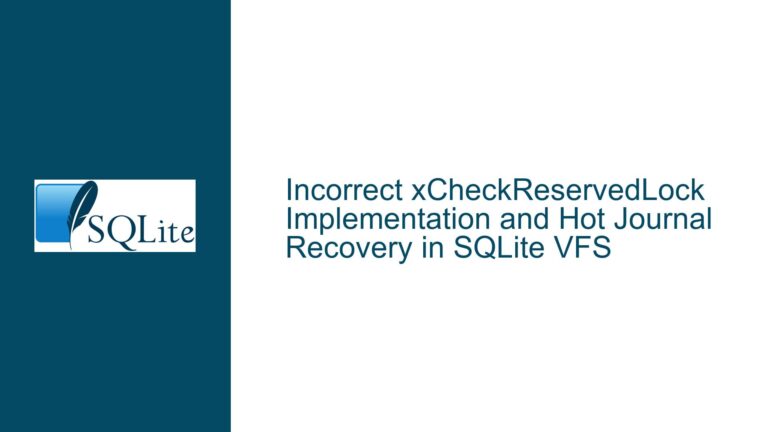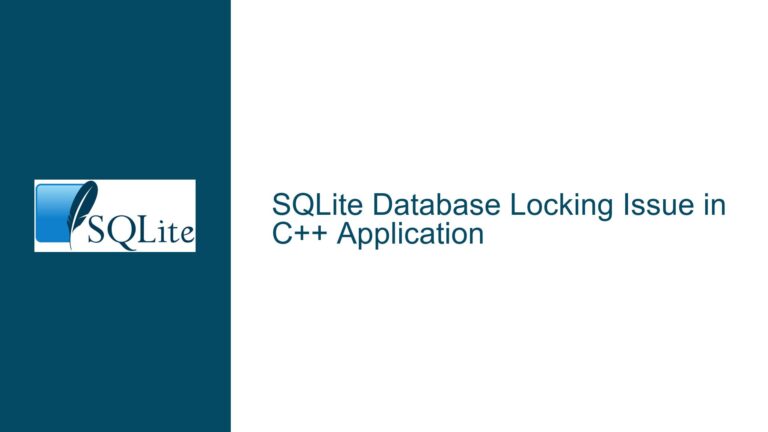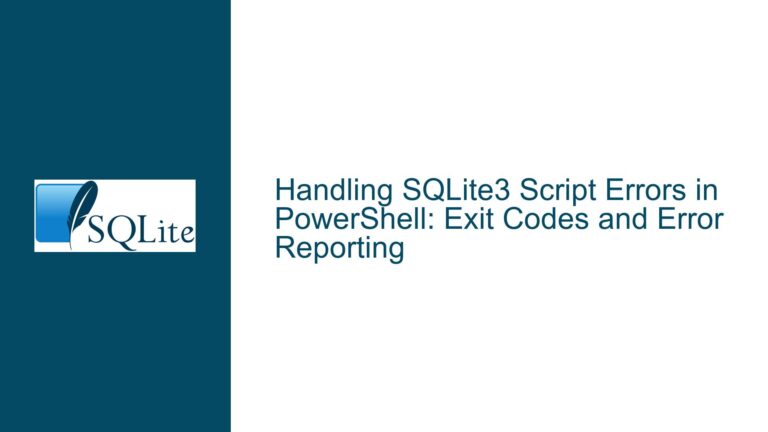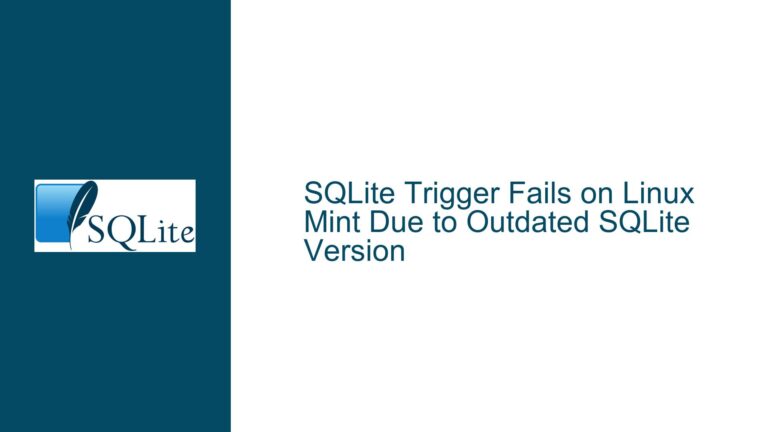Concurrent PRAGMA Data and Temp Store Directory Risks in SQLite
Issue Overview: Unsafe Concurrent Access to PRAGMA data_store_directory and PRAGMA temp_store_directory
The core issue revolves around the unsafe concurrent access to the global variables sqlite3_data_directory and sqlite3_temp_directory when using the PRAGMA data_store_directory and PRAGMA temp_store_directory statements in SQLite. These PRAGMAs allow users to set or retrieve the directory paths where SQLite stores its database and temporary files, respectively. However, the implementation of these PRAGMAs lacks proper synchronization mechanisms, making them susceptible to race conditions when accessed concurrently from multiple threads.
The problem arises because the global variables sqlite3_data_directory and sqlite3_temp_directory are not protected by a mutex or any other form of thread synchronization. When multiple threads attempt to modify these variables simultaneously, it can lead to severe memory-related issues such as use-after-free, double-free, or other undefined behaviors. These issues are not merely theoretical; they can be triggered by careless code that does not account for the lack of thread safety in these PRAGMAs.
The SQLite documentation explicitly warns against using these PRAGMAs in a multi-threaded environment, but this warning is buried in the documentation and may not be immediately apparent to developers. This creates a significant risk, especially for developers who expose SQLite functionality through safe APIs, as they may inadvertently allow users to execute these dangerous PRAGMAs without realizing the potential consequences.
Possible Causes: Lack of Thread Synchronization and Documentation Ambiguity
The root cause of this issue lies in the lack of thread synchronization around the global variables sqlite3_data_directory and sqlite3_temp_directory. When a thread executes a PRAGMA data_store_directory or PRAGMA temp_store_directory statement, the SQLite library directly modifies these global variables without any locking mechanism. This means that if two or more threads attempt to modify these variables at the same time, the results are unpredictable and can lead to memory corruption.
Another contributing factor is the ambiguity in the SQLite documentation. While the documentation does mention that these PRAGMAs are not thread-safe, this warning is not prominently displayed and can easily be overlooked. The documentation also emphasizes SQLite’s robustness against malicious SQL inputs, which creates a false sense of security. Developers may assume that SQLite is immune to memory-related issues caused by SQL statements, but this is not the case with these PRAGMAs.
Furthermore, the issue is exacerbated by the fact that these PRAGMAs are still available by default in SQLite, despite their inherent dangers. While there is a configuration option to exclude these PRAGMAs (SQLITE_OMIT_DEPRECATED), it is not enabled by default, and many developers may not be aware of its existence. This leaves the door open for potential misuse, especially in multi-threaded applications where the risks are highest.
Troubleshooting Steps, Solutions & Fixes: Mitigating the Risks of Unsafe PRAGMAs
To address the risks associated with PRAGMA data_store_directory and PRAGMA temp_store_directory, developers can take several steps to mitigate the potential for memory corruption and other undefined behaviors. These steps range from immediate workarounds to long-term solutions that involve changes to the SQLite library itself.
1. Use the SQLITE_OMIT_DEPRECATED Compile-Time Option
One of the simplest ways to mitigate the risks associated with these PRAGMAs is to exclude them from the SQLite library altogether. This can be done by enabling the SQLITE_OMIT_DEPRECATED compile-time option. When this option is enabled, the deprecated PRAGMAs, including PRAGMA data_store_directory and PRAGMA temp_store_directory, are removed from the library, preventing them from being used.
To enable this option, developers need to recompile SQLite with the SQLITE_OMIT_DEPRECATED flag set. This can be done by adding the following line to the SQLite compilation configuration:
#define SQLITE_OMIT_DEPRECATED 1
By excluding these PRAGMAs, developers can ensure that their applications are not exposed to the risks associated with concurrent access to sqlite3_data_directory and sqlite3_temp_directory.
2. Enable the SQLITE_DB_CONFIG_DEFENSIVE Flag
Another approach to mitigating the risks is to enable the SQLITE_DB_CONFIG_DEFENSIVE flag. This flag is designed to make SQLite more resistant to potentially dangerous operations, including the use of deprecated or unsafe PRAGMAs. When this flag is set, SQLite disables the PRAGMA data_store_directory and PRAGMA temp_store_directory statements, preventing them from being executed.
To enable the SQLITE_DB_CONFIG_DEFENSIVE flag, developers can use the sqlite3_db_config function as follows:
sqlite3_db_config(db, SQLITE_DB_CONFIG_DEFENSIVE, 1, 0);
This will disable the dangerous PRAGMAs for the specified database connection, reducing the risk of memory corruption in multi-threaded environments.
3. Implement a Custom Authorization Hook
For developers who cannot recompile SQLite or enable the SQLITE_DB_CONFIG_DEFENSIVE flag, another option is to implement a custom authorization hook. This hook can be used to intercept and block the execution of dangerous PRAGMAs, preventing them from being used in a multi-threaded environment.
To implement a custom authorization hook, developers can use the sqlite3_set_authorizer function. This function allows developers to register a callback that is invoked whenever a SQL statement is prepared. The callback can then inspect the statement and decide whether to allow or deny its execution.
Here is an example of how to implement a custom authorization hook to block the dangerous PRAGMAs:
int auth_callback(void* user_data, int action_code, const char* arg1, const char* arg2, const char* db_name, const char* trigger_name) {
if (action_code == SQLITE_PRAGMA) {
if (strcmp(arg1, "data_store_directory") == 0 || strcmp(arg1, "temp_store_directory") == 0) {
return SQLITE_DENY;
}
}
return SQLITE_OK;
}
sqlite3_set_authorizer(db, auth_callback, NULL);
This authorization hook will block any attempt to execute the PRAGMA data_store_directory or PRAGMA temp_store_directory statements, ensuring that they cannot be used in a way that could lead to memory corruption.
4. Apply a Global Mutex to Protect the Variables
For developers who have control over the SQLite source code, a more robust solution is to apply a global mutex to protect the sqlite3_data_directory and sqlite3_temp_directory variables. This would ensure that only one thread can modify these variables at a time, preventing race conditions and memory corruption.
To implement this solution, developers need to add a global mutex to the SQLite library and modify the code that accesses the sqlite3_data_directory and sqlite3_temp_directory variables to lock the mutex before making any changes. Here is an example of how this could be done:
#include <sqlite3.h>
#include <pthread.h>
static pthread_mutex_t data_dir_mutex = PTHREAD_MUTEX_INITIALIZER;
static pthread_mutex_t temp_dir_mutex = PTHREAD_MUTEX_INITIALIZER;
void set_data_directory(const char* path) {
pthread_mutex_lock(&data_dir_mutex);
sqlite3_free(sqlite3_data_directory);
sqlite3_data_directory = sqlite3_mprintf("%s", path);
pthread_mutex_unlock(&data_dir_mutex);
}
void set_temp_directory(const char* path) {
pthread_mutex_lock(&temp_dir_mutex);
sqlite3_free(sqlite3_temp_directory);
sqlite3_temp_directory = sqlite3_mprintf("%s", path);
pthread_mutex_unlock(&temp_dir_mutex);
}
By adding these mutexes, developers can ensure that the sqlite3_data_directory and sqlite3_temp_directory variables are accessed in a thread-safe manner, eliminating the risk of memory corruption.
5. Update the SQLite Documentation
Finally, it is important to update the SQLite documentation to make the risks associated with these PRAGMAs more prominent. The documentation should clearly state that PRAGMA data_store_directory and PRAGMA temp_store_directory are not thread-safe and should not be used in multi-threaded environments. Additionally, the documentation should provide guidance on how to mitigate the risks, such as using the SQLITE_OMIT_DEPRECATED compile-time option, enabling the SQLITE_DB_CONFIG_DEFENSIVE flag, or implementing a custom authorization hook.
By updating the documentation, developers will be better informed about the risks and will be able to take appropriate measures to protect their applications from memory corruption and other undefined behaviors.
Conclusion
The concurrent access to PRAGMA data_store_directory and PRAGMA temp_store_directory in SQLite poses a significant risk of memory corruption and other undefined behaviors in multi-threaded environments. The lack of thread synchronization around the global variables sqlite3_data_directory and sqlite3_temp_directory makes these PRAGMAs inherently unsafe, and the ambiguity in the SQLite documentation further exacerbates the issue.
To mitigate these risks, developers can take several steps, including excluding the dangerous PRAGMAs using the SQLITE_OMIT_DEPRECATED compile-time option, enabling the SQLITE_DB_CONFIG_DEFENSIVE flag, implementing a custom authorization hook, or applying a global mutex to protect the variables. Additionally, updating the SQLite documentation to make the risks more prominent will help developers make informed decisions and avoid potential pitfalls.
By taking these measures, developers can ensure that their applications remain safe and reliable, even in multi-threaded environments where the risks of memory corruption are highest.






